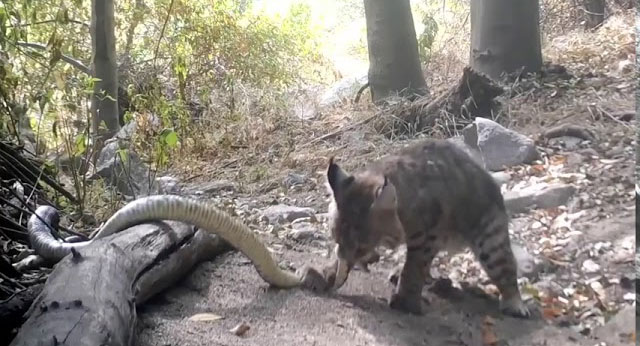The lynx uses its reflexes to dodge every attack from the rattlesnake, before revealing its terrifying prowess to the enemy.
In the wild, both the lynx and the rattlesnake are ambush predators, targeting small mammals like mice, squirrels, and birds. However, when they accidentally encounter each other, they are ready to fight to take down their opponent.
A short clip recorded by a dashcam shows a rare life-and-death struggle between these two animal species. It appears that the lynx was the first to detect the presence of the snake and continuously used its front paws to “probe” the situation.
Immediately, the rattlesnake demonstrated that it was not an easy target, lunging forward to deliver lethal strikes. Their venom can quickly paralyze the nervous system of their prey, causing the victim’s heart to stop just a few minutes after being bitten.
However, the lynx, with its incredibly quick reflexes and sharp claws, did not give the rattlesnake a chance to sink its fangs into its body.
In the footage, we can see the lynx’s impressive reflexes allowing it to dodge all of the rattlesnake’s strikes while continuously attacking the enemy with its front paws.
When the lynx’s claws pierced the snake’s head, it delivered a finishing blow with a powerful bite to the neck, completely incapacitating the creature.

Lynx defeats rattlesnake with lightning-fast attack
The lynx (Lynx rufus), also known as the bobcat, is a medium-sized cat native to North America. They are a predatory species capable of adapting to heavily wooded areas and urban outskirts thanks to their excellent climbing skills, and they can also be domesticated as pets.
Lynxes have extremely keen hearing and vision, along with a good sense of smell. Their eyes are yellow with round, black pupils. The pupils expand when active at night to maximize light intake. Thus, like other cat species, lynxes can see and hunt effectively in the dark.
They also possess remarkable reflexes, combined with sharp hunting instincts. These traits enable lynxes to easily hunt and take down rabbits, mice, chickens, geese, and various birds in the wild.
Additionally, it has been recorded that lynxes hunt deer or moose by biting their necks until the unfortunate animal succumbs.
When encountering snakes, lynxes rarely lose, as their reflexes are much faster than those of the snake, and they always maintain the necessary initiative to put their opponent at a disadvantage.


















































